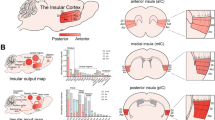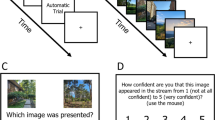Summary
Previous research has demonstrated that the emotional properties of words and their imaginability affect their recallability and that verbal material is recalled better when it is related to subjects' current concerns. This study investigates the extent to which this effect of emotion on recall varies as a function of cognitively controllable inference processes and examines the relation of the effects of emotion to those of imaginability and concern-relatedness. Forty different words were presented visually under one of six orienting conditions that varied according to what the subject was asked to rate: their length, pronounceability, concreteness, defineability, the strength of emotion elicited by the word, and the relation of the word to personal concerns. Subjects were then asked to write as many words as they could recall. Words that aroused stronger emotion and were easier to represent in imagery were recalled better than emotionally less arousing and imaginally less evocative words, regardless of the nature of the orienting task. The evidence suggests that the emotional properties of words are evaluated automatically in an early processing stage, without requiring subjects to reflect on word content. Emotional arousal appears to mediate the effects of current concerns on recall. It is correlated with but appears to function independently of word imaginability.
Similar content being viewed by others
References
Bock, M. (1976). The influence of instructions on feature selection in semantic memory. Journal of Verbal Learning and Verbal Behavior, 15, 183–191.
Bock, M. (1980). Angenehme und unangenehme Erfahrungen aus gedächtnispsychologischer Sicht — Bilanz einer 80jährigen Forschung. Psychologische Beiträge, 22, 280–292.
Bock, M. (1986). The influence of emotional meaning on the recall of words processed for form or for self-reference. Psychological Research, 48, 107–112
Bower, G.H. (1981). Mood and memory. American Psychologist, 36, 129–148.
Craik, F.I.M. (1979). Levels of processing: Overview and closing comments. In L.S. Cermak & F.I.M. Craik (Eds.). Levels of processing in human memory (pp. 447–461). Hillsdale, N.J.: Erlbaum.
Craik, F.I.M., & Lockhart, R.S. (1972). Levels of processing: A framework for memory research. Journal of Verbal Learning and Verbal Behavior, 11, 671–684
Craik, F.I.M., & Tulving, E. (1975). Depth of processing and the retention of words in episodic memory. Journal of Experimental Psychology: General, 104, 268–294.
Eysenck, M.W. (1979). Depth, elaboration, and distinctiveness. In L.S. Cermak & F.I.M. Craik (Eds.), Levels of processing in human memory (pp. 89–118). Hillsdale, N.J.: Erlbaum.
Eysenck, M.W., & Eysenck, M.C. (1979). Processing depth, elaboration of encoding, memory stores, and expended processing capacity. Journal of Experimental Psychology: Human Learning and Memory, 5, 472–484.
Hoelscher, T.J., Klinger, E., & Barta, S.G. (1981). Incorporation of concern- and nonconcern-related stimuli into dream content. Journal of Abnormal Psychology, 90, 88–91.
Jacoby, L.L., & Craik, F.I.M. (1979). Effects of elaboration of processing at encoding and retrieval: Trace distinctiveness and recovery of initial context. In L.S. Cermark & F.I.M. Craik (Eds.), Levels of processing in human memory (pp. 1–21). Hillsdale, N.J.: Erlbaum.
Kanungo, R.N., & Dutta, S. (1966). Retention of affective material: Frame of reference or intensity. Journal of Personality and Social Psychology, 4, 27–35.
Klein, K., & Saltz, E. (1976). Specifying the mechanisms in a levels-of-processing approach to memory. Journal of Experimental Psychology: Human Learning and Memory, 2, 671–679.
Klinger, E. (1971). Structure and functions of fantasy. New York: Wiley.
Klinger, E. (1977). Meaning and void: Inner experience and the incentives in people's lives. Minneapolis: University of Minnesota Press.
Klinger, E. (1978). Modes of normal conscious flow. In K.S. Pope & J.L. Singer (Eds.), The stream of consciousness: Scientific investigations into the flow of human experience (pp. 225–258). New York: Plenum.
Klinger, E., Barta, S.G., & Maxeiner, M.E. (1980). Motivational correlates of thought content frequency and commitment. Journal of Personality and Social Psychology, 39, 1222–1237.
Kuiper, N.A., & Rogers, T.B. (1979). Encoding of personal information: Self-other differences. Journal of Personality and Social Psychology, 37, 499–514.
Marcel, A.J. (1983). Conscious and unconscious perception: Experiments on visual masking and word recognition. Cognitive Psychology, 15, 197–237.
Morris, C.D., Bransford, J.D., & Franks, J.J. (1977). Levels of processing versus transfer appropriate processing. Journal of Verbal Learning and Verbal Behavior, 16, 519–533.
Nelson, D.L., Walling, J.R., & McEvoy, C.L. (1979). Doubts about depth. Journal of Experimental Psychology: Human Learning and Memory, 5, 24–44.
Paivio, A.D. (1978). Mental comparisons involving abstract attributes. Memory and Cognition, 6, 199–208.
Posner, M.J., & Snyder, C.R.R. (1975). Attention and cognitive control. In R. Solso (Ed.), Information processing and cognition: The Loyola Symposium (Vol. 5, pp. 669–682). Potomac, Maryland: Erlbaum.
Rogers, T.B., Kuiper, N.A., & Kirkner, W.S. (1977). Self-reference and the encoding of personal information. Journal of Personality and Social Psychology, 35, 677–688.
Schneider, W., & Shiffrin, R.M. (1977). Controlled and automatic human information processing: I. Detection, search, and attention. Psychological Review, 84, 1–66.
Schönpflug, W., & Beike, P. (1964). Einprägen und Aktivierung bei gleichzeitiger Variation der Ich-Bezogenheit des Lernstoffs. Psychologische Forschung, 27, 366–376.
Schürer-Necker, E. (1984). Das emotionale Erregungspotential. In A. v. Eye & W. Marx (Eds.), Sematische Dimensionen (pp. 11–32). Göttingen: Hogrefe.
Shiffrin, R.M., & Schneider, W. (1977). Controlled and automatic human information processing: II. Perceptual learning, automatic attending, and a general theory. Psychological Review, 84, 127–190.
Stein, B.S. (1978). Depth of processing reexamined: The effects of the precision of encoding and test appropriateness. Journal of Verbal Learning and Verbal Behavior, 17, 165–174.
Wippich, W. (1984). Bildhaftigkeit, Konkretheit und Emotionalität: Dimension beim Behalten verbalen Materials? In A. v. Eye & W. Marx (Eds.), Semantische Dimensionen (pp. 45–72). Göttingen: Hogrefe.
Zajonc, R.B. (1980). Feeling and thinking: Preferences need no inferences. American Psychologist, 35, 151–175.
Author information
Authors and Affiliations
Rights and permissions
About this article
Cite this article
Bock, M., Klinger, E. Interaction of emotion and cognition in word recall. Psychol. Res 48, 99–106 (1986). https://doi.org/10.1007/BF00309323
Received:
Issue Date:
DOI: https://doi.org/10.1007/BF00309323




